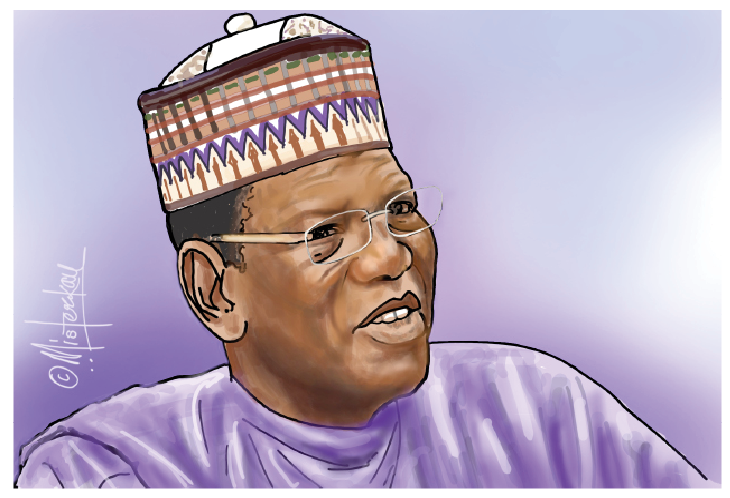On May 13, 2025, at the NAF Conference and Convention Centre in Abuja, a diverse crowd gathered to witness the official launch of Being True to Myself, the long-awaited autobiography of Alhaji Sule Lamido, CON. Among the attendees were family members, close friends, political associates, and countless admirers, all eager to explore the candid revelations contained within the pages of this remarkable work.
Born on August 30, 1948, in Bamaina village, Birnin Kudu Local Government Area of Jigawa State, Sule Lamido’s journey from a rural setting to the pinnacle of Nigerian politics is a story of determination and authenticity. His early education began at Birnin Kudu Primary School in 1955. He later proceeded to Barewa College, Zaria, an institution renowned for producing many of Nigeria’s leaders. Furthering his technical skills, he studied railway engineering at the Permanent Way Training School in Zaria, acquiring valuable expertise that laid a practical foundation for his future endeavours.
Before entering the political arena, Lamido gained valuable work experience, including a stint as a Quality Control Officer at the Nigeria Tobacco Company and roles within Bamaina Holding Company and other enterprises. These formative years were crucial in shaping a grounded and pragmatic leader who would later wield his blunt honesty as a defining feature of his public life.
Being True to Myself captures this foundation with insightful detail, showing the roots of a man who has never been afraid to speak candidly about his life or the country’s challenges.
Early Political Foundations: NEPU, PRP, And Aminu Kano
Sule Lamido’s political activism began long before the founding of the People’s Democratic Party (PDP). His early affiliations were with the Northern Elements Progressive Union (NEPU) and the People’s Redemption Party (PRP), both political movements grounded in social justice, equity, and the empowerment of marginalized Northern communities.
During Nigeria’s Second Republic, Lamido served as a national legislator, where he developed a close working relationship with the late Aminu Kano, a towering figure in Nigerian politics and an unwavering advocate for the poor and disenfranchised. In Being True to Myself, Lamido pays homage to Aminu Kano’s influence on his political philosophy, describing the mentorship as pivotal in shaping his uncompromising stand on social equity and good governance.
Lamido’s blunt and unapologetic style, often mistaken for arrogance, is rooted in these early years of principled activism. He learned that political leadership requires speaking uncomfortable truths, even when such frankness is unpopular. This early political grounding shaped a man who has remained unwavering in his pursuit of justice and reform throughout his career.
The PDP: Founding Father and Loyal Party Man
The formation of the PDP in the late 1990s marked a significant turning point in Nigeria’s political history, and Sule Lamido was at the heart of it as one of the G-9 founding members. As Nigeria transitioned from military rule to democracy, Lamido contributed significantly to the party’s emergence as the dominant political force in the country.
Being True to Myself offers readers a rare, insider’s perspective on the complex and often turbulent internal dynamics of the PDP. Lamido’s narrative is unapologetically frank, detailing factionalism, ideological battles, and power struggles with unvarnished honesty. Despite the challenges and periodic betrayals, Lamido’s loyalty to the PDP remains unshaken. He has refused to defect or abandon the party, choosing instead to confront its challenges head-on.
Many critics interpret his forthrightness as arrogance, but the book reveals a different reality: a man who prioritizes integrity and transparency over political expediency. His blunt assessments of party politics demonstrate his commitment to Being True to Myself, never hiding behind empty platitudes or political niceties.
Minister of Foreign Affairs: Navigating Global Diplomacy
Before his tenure as governor, Sule Lamido served as Nigeria’s Minister of Foreign Affairs under President Olusegun Obasanjo from 1999. His time in this role came at a critical juncture when Nigeria was reasserting its place on the international stage after years of military rule.
In Being True to Myself, Lamido does not shy away from candidly recounting the challenges and successes of his tenure. His storytelling is peppered with humour, offering moments of levity even amidst the high-pressure environment of global diplomacy. He provides blunt critiques of international partners and internal government dynamics, revealing the complexity of balancing national interests with foreign policy realities.
Lamido’s straightforwardness, which some regard as abrasiveness, here serves as an asset, a reflection of his desire to be honest and clear in all dealings. This candid approach has become a hallmark of his political identity, earning him both admiration and controversy.
Governor Of Jigawa: Championing Rural Transformation
Perhaps the most impactful chapter of Sule Lamido’s career is his eight years as governor of Jigawa State (2007-2015), a tenure marked by a resolute focus on pro-poor policies and rural development. His administration is widely recognized for bringing tangible improvements to the lives of the state’s largely rural population.
Being True to Myself offers a comprehensive look at Lamido’s governance philosophy. His pro-poor agenda translated into significant investments in infrastructure – constructing roads, schools, and healthcare centers designed to uplift the rural economy. Educational reforms under his watch focused on boosting enrollment rates, particularly for girls, while expanding access to quality healthcare and clean water.
Lamido’s rural transformation initiatives were not mere rhetoric; they were grounded in strategic planning and real budgetary commitments. His leadership style remained consistent – direct, candid, and results-oriented. The book highlights his belief that confronting Nigeria’s challenges requires honest conversations, transparent governance, and unwavering dedication to service.
Humour, Honesty, and the Man Behind the Myth
Throughout Being True to Myself, Sule Lamido’s personality shines through as a blend of humour, candour, and unrelenting honesty. His critics often mistake his bluntness for arrogance, but the book reveals a man who embraces authenticity even when it is inconvenient.
His humour punctuates the narrative, softening moments of tension and conflict while revealing a man who never takes himself too seriously. Whether recalling fiery political debates or personal anecdotes, Lamido’s wit is a reminder that even in the harsh world of politics, laughter and humility have a place.
His unwavering loyalty to his party, despite its flaws, and his steadfast commitment to his principles underscore the essence of the book’s title. Lamido’s refusal to compromise on his core beliefs, regardless of the political cost – defines his legacy.
A Life Truly Lived
As I read the last chapters of Being True to Myself, I found a portrait of a leader whose life has been marked by courage, conviction, and consistency. From the humble beginnings in Bamaina to the national and international stage, Sule Lamido’s story is a testament to the power of staying authentic amid complex political realities.
His journey is a vivid reminder that leadership in Nigeria demands more than political savvy, it requires an unshakable commitment to truth and service. While some may quarrel with his style or disagree with certain policies, Lamido’s legacy is clear: a man who has always been true to himself.
His autobiography is not just a personal memoir; it is a challenge to current and future leaders to embrace authenticity, transparency, and service to the people above all else.




